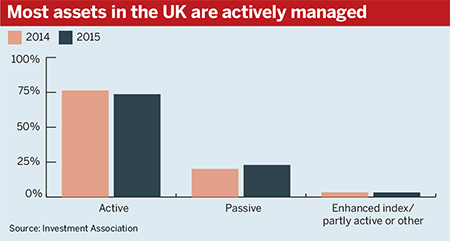About £109bn of investor assets is held by managers who charge high fees but do not offer significant variation from an index-tracking strategy, the Financial Conduct Authority’s interim report on competition in the asset management market has found.
The report also criticised investment consultants’ ability to select managers, and highlighted potential conflicts of interest, concluding that investors struggle to assess the value of advice.
The FCA will now consult on making a market investigation reference to the Competitions and Markets Authority on the subject.
It’s very difficult for someone who’s employing an investment consultant to be able to make an assessment of whether their advice has actually added value over time
Christopher Woolard, FCA
The final report is due next year, with implementation of any rule changes to follow shortly after.
One key proposal in last Friday’s report was the introduction of an ‘all-in’ fee for pension funds using asset management services.
“The aim of [the all-in fee] is to try and make pricing as clear and transparent as possible, so it’s not about having huge amounts of information, it’s about having the right information,” said Christopher Woolard, the FCA’s director of strategy and competition.
The FCA also called for increased transparency and standardisation of costs and charges information.
Greater transparency will result in fee pressure and increased accountability for funds, said David Ferguson, chief executive at wrap platform Nucleus. “That means either getting better at what they do, reducing costs, or both,” he said.
Ferguson added that groups that are unable to respond positively may find themselves vulnerable to an accelerating consolidation trend.
Weak price competition
The FCA also said that there is weak price competition in a number of areas of the fund management industry, which has an impact on investment returns through investors’ payments of asset management services.
James Trask, partner at consultancy LCP, said the debate around fees being too high is not new. However, “I’m not convinced that competition isn’t necessarily working,” he said.
“Where hedge funds’ fees are... too high, we’ve seen the growth of much lower-cost multi-asset funds that don’t charge hedge fund fees,” said Trask.
Marc Haynes, senior vice president at asset management company Cohen & Steers, said active management fees will have to change: “This feels somewhat like another nail in the coffin for current fee rates for long-only active managers.”
Investors are disillusioned with high fees, leading to “an enormous growth in lower-cost passive index-tracking”, as well as outcome solutions designed to deliver income in a low-yield environment.
Assessing consultants
The report also looked at the consulting industry, concluding that it is concentrated, with 60 per cent of the market relying on the advice of a select few advisers. Few schemes switched consultant in the last five years.
“It’s very difficult for someone who’s employing an investment consultant to... be able to make an assessment of whether their advice has actually added value over time,” said Woolard.
The FCA also said that on average, consultants are not able to identify managers that provide the best returns, meaning that the behaviours of small schemes can resemble those of unsophisticated retail investors.
It will consult on flagging the issue to the CMA, with a possible view to extending its remit to include consultants.
Tailored advice
For Danny Vassiliades, managing director at consultancy Punter Southall, investment advice should be tailored to the needs of each scheme, meaning only certain elements of advice, such as manager recommendations, can be measured.
But he said that schemes should already be wary of chasing alpha: “There is clear value for money in using passive funds [...] and it’s hard to justify doing anything else.”
Richard Butcher, managing director at professional trustee company PTL, said it would be possible to measure consultant performance if the right measurements were chosen.
Outperformance is a secondary concern when assessing a consultant, noted Butcher.
“They’re there to help you choose the right [type of] product,” he said.
FCA lights the way on transparency
‘A big flashing neon light’ marking the direction of travel on transparency has been lit by the Financial Conduct Authority with its proposal to make asset managers disclose transaction costs to defined contribution schemes.
Conflicts of interest
The FCA expressed concerns about conflicts of interest in the consulting industry, highlighting a “strong culture of gifts and hospitality” and consultants’ incentivisation towards giving favourable reviews to products they have previously recommended.
Fiduciary managers were not spared either, described as “amongst the most opaque parts of the asset management value chain”.
Richard Dowell, head of clients at fiduciary manager Cardano, said the industry desperately needs to improve its transparency by demonstrating value in relation to client objectives.
“Ultimately all trustees are looking to improve their funding ratio,” he said. “Therefore the performance measurement should be exactly on that basis, importantly net of fees.”

















